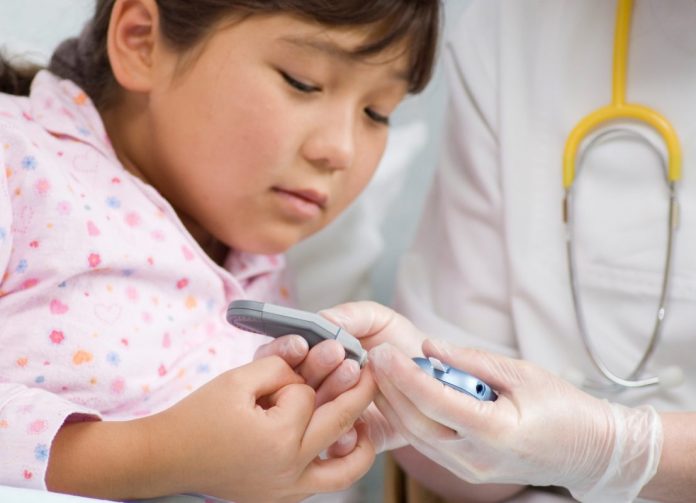Dr Justin Warner, Clinical Lead for the National Paediatric Diabetes Audit at the Royal College of Paediatrics and Child Health details how continued improvements in diabetes care for children is needed in England and Wales…
According to latest statistics, the outcomes for children and young people with type 1 diabetes in England and Wales are improving.
The National Paediatric Diabetes Audit (NPDA) 2014/15, which measures quality improvement in care, has suggested that these changes are secondary to a number of influences including advancements in research, improved technology, structured education and a better understanding of the condition and patient needs.
In addition, the establishment of managed clinical networks, quality assurance measurements, the publication of service delivery plans in England and Wales, along with England’s ‘best practice tariff’ has enabled Trusts and Health Boards delivering care to improve the quality of service they provide. Families of children and young people with diabetes have also had a large influence on shaping the future of services by providing feedback on the experience of care they receive.
The NPDA published earlier this year by the Royal College of Paediatrics and Child Health (RCPCH), has identified more children than ever before achieving excellent diabetes control. Furthermore, the rate of improvement seen in England and Wales has exceeded that of some other European countries. Something healthcare professionals can be proud of.
According to the audit, which looked at data from all 27,682 children and young people with diabetes who attended paediatric diabetes units in England and Wales between 1 April 2014 and 31 March 2015, the average blood glucose level (HbA1C) – a marker which measures overall diabetes control – in children reduced for the fifth consecutive year with 23.5% of children in 2014/15 having excellent control compared to 15.8% in 2012/13. This means that overall children and young people with diabetes are reducing their lifetime risk of diabetes-associated complications such as kidney disease, blindness and amputations.
However, whilst the audit brought much to be celebrated, it also highlighted areas of concern, emphasising much more that needs to be done – particularly around recording health checks and variation in care seen across the two nations.
The audit also found that, despite the number of children receiving recommended healthcare checks improving year on year, just 25.4% of 12-year-olds have all 7 checks performed – HbA1c, height and weight, blood pressure, kidneys, cholesterol level – although NICE has recently removed this as a key health check – eye screening and foot examination. This is concerning as these checks are performed to identify risk factors associated with the potential development of long -term complications from the disease. They enable professionals to identify complications at the earliest opportunity when they are amenable to interventions and more likely to see a reduction in progression.
Worryingly, high numbers of children over the age of 12 are already beginning to demonstrate early markers associated with complications such as kidney disease and blindness. So why are these checks being missed and what can we do to improve this?
The NPDA relies on paediatric diabetes units to record and document this information on an annual basis. In some cases, children are receiving these checks but due to pressures on staff and poor IT recording facilities, they are not able to log this information formally. Appropriate IT systems need to be in place to allow those providing care to capture their activity, record it and demonstrate ongoing improvement.
Continued improvement is required if England and Wales are to achieve standards set by some of our European counterparts. It is vitally important that centres providing care for children and young people are adequately staffed including consultants trained in paediatric diabetes, specialist diabetes nurses, diabetes dietitians and psychologists. Centres are now working as part of networks to ensure standards are met and guidelines implemented at a regional and national level thereby leading to a reduction in the variability in outcomes seen. Families also have an important role to play when it comes to improving care delivered to children so it is vital they are equipped with the right information as early as possible.
Structured regional and national education programmes for children and their families should be given at diagnosis and then through key life stages of the child. Currently, there is no formal recognised universal structured education programme in the UK yet there are examples up and down the county of extremely good practice. We know from looking at the audit data that just over half (58%) of children and young people were recorded as receiving structured educational programmes so there is clearly a long way to go.
Managing diet, blood glucose levels and insulin requirements are a challenging balancing act for families. It can impact on relationships, emotions and health and well-being. For some, psychological help in addition to educational support is crucial to achieving an optimal outcome. According to the NPDA, the use of mental health services for nearly half of children with diabetes was not documented, suggesting they are not being offered this support. However, in many centres the provision of psychological support is changing for the better with clinical psychologists becoming embedded within the diabetes service itself – this can only be of benefit to children and young people and their families living with this chronic disease.
There is clearly a lot England and Wales can be proud of when it comes to paediatric diabetes care but it is crucial that the shortfalls identified are addressed. By doing so, it will enable us to move ahead of the pack, positioning ourselves as service leaders and a country that others strive to match when it comes to outcomes for paediatric diabetes care.
Dr Justin Warner
Clinical Lead for the NPDA
Royal College of Paediatrics and Child Health











